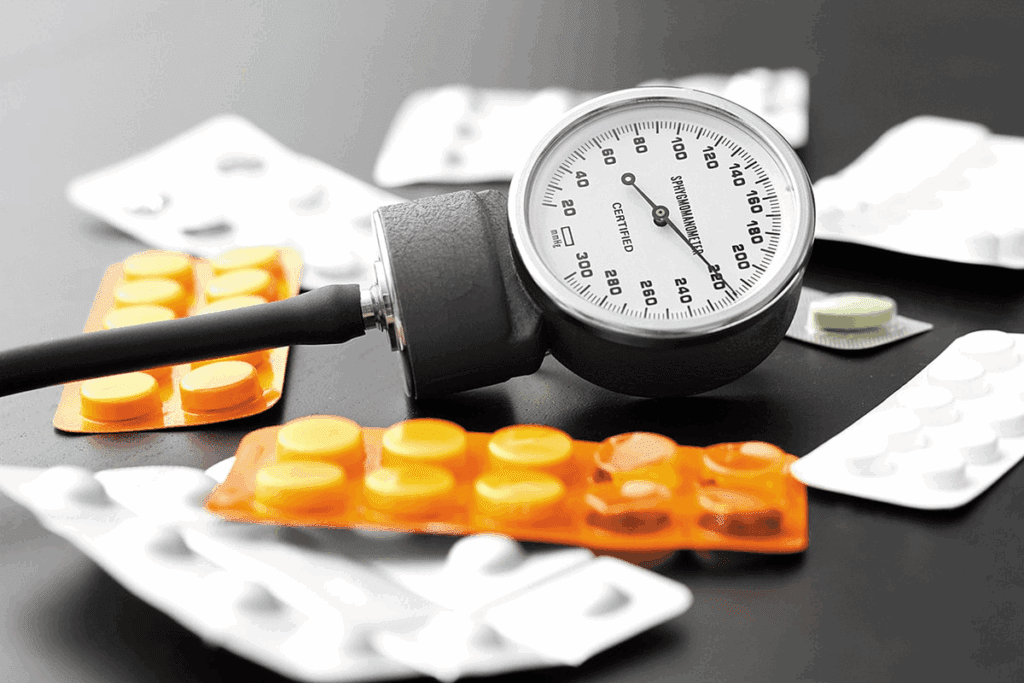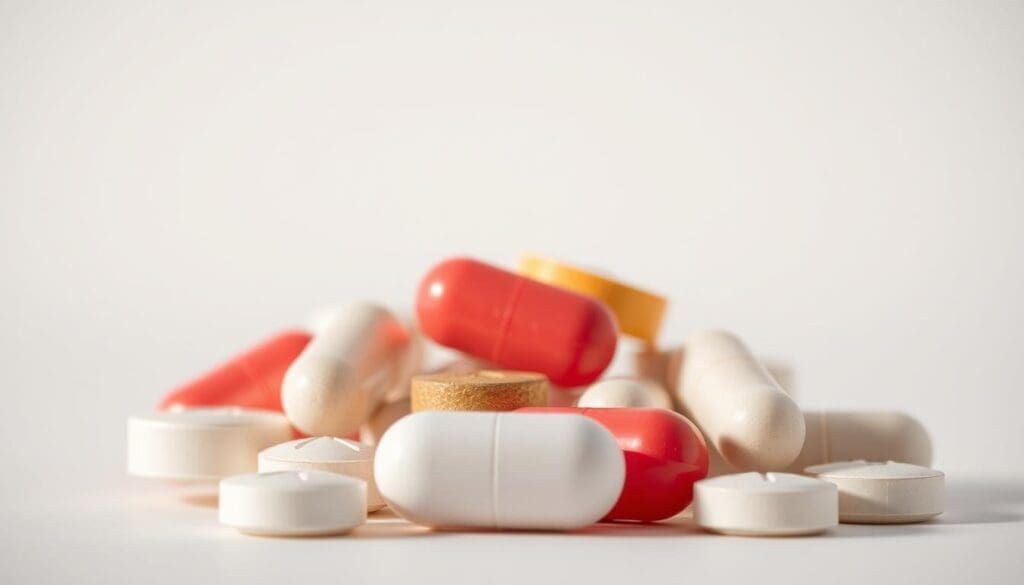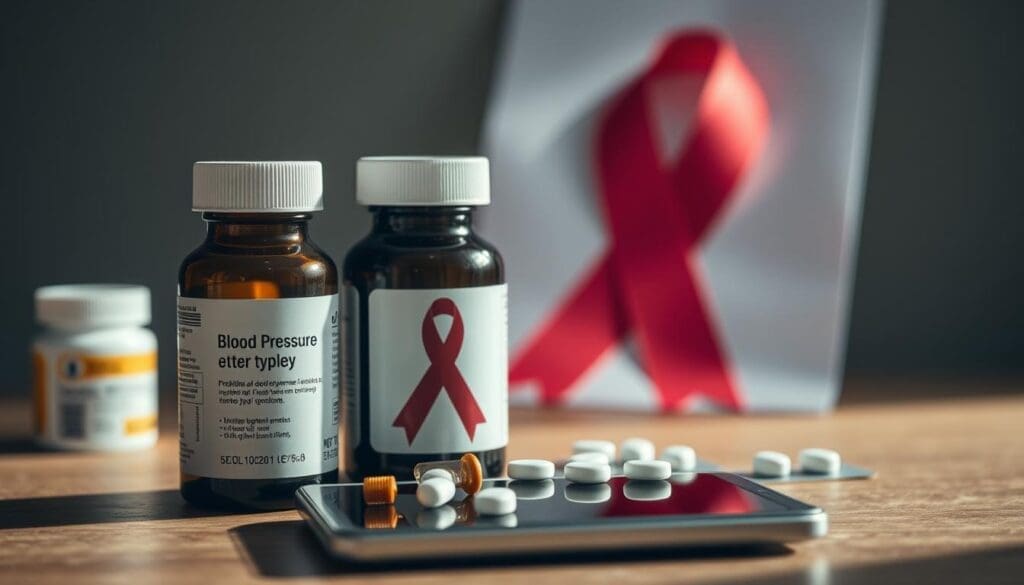
High blood pressure is a big health issue that affects millions. Managing it often means taking medicine, but some can harm sexual health. Understanding the link between blood pressure meds and erectile dysfunction is key to good treatment. Which blood pressure drugs and erectile dysfunction link? Find out which common antihypertensive medications can cause ED as a side effect.
Studies show that nearly 70% of men stop their blood pressure meds because of side effects. This shows how important it is to know how these meds can affect sex life.
Key Takeaways
- Some blood pressure medications are linked to a higher risk of erectile dysfunction.
- Knowing the different types of blood pressure meds can help find safer ones.
- Changing your lifestyle can also help manage blood pressure and lower erectile dysfunction risk.
- Patients should talk to their doctors to find the best treatment.
- Being aware and educated is vital to handle the side effects of blood pressure meds.
The Relationship Between Hypertension Medications and Sexual Function

The link between blood pressure drugs and erectile dysfunction is complex. It changes with different types of drugs. Hypertension, or high blood pressure, is a common condition affecting millions globally. It often requires long-term medication.
These drugs are key in managing hypertension and preventing heart problems. But, they can also affect sexual function, like erectile dysfunction (ED), which worries many patients.
How Blood Pressure Medications Affect Male Sexual Health
Blood pressure drugs work in different ways to lower blood pressure. Some ways can impact sexual health. For example, some drugs might reduce blood flow to the penis, making it hard to get or keep an erection. Others might change hormone levels or nerve signals needed for sex.
Some blood pressure drugs are linked more to ED, like beta-blockers and diuretics. Beta-blockers can lower blood flow force, which might hurt erectile function. Diuretics can cause dehydration if not managed right, which also affects sex performance.
Prevalence of ED Among Hypertension Patients
Research shows men with hypertension are more likely to have erectile dysfunction than those without it. The underlying vascular issues of hypertension can lead to ED, even without medication.
A detailed look at studies shows the rate of ED in men with hypertension varies. It depends on the drugs used and the patient’s situation. While some men face big sexual side effects, others might not notice any issues.
It’s important for doctors to understand how hypertension drugs and sex function are connected. This helps them make better treatment plans. These plans should consider both heart health and sexual well-being.
Why Erectile Dysfunction Blood Pressure Meds Lead to Treatment Non-Adherence

There’s a big worry about blood pressure meds and erectile dysfunction (ED). This worry is for both patients and doctors. The effect of these meds on sex can be big, making people stop taking their meds.
The 70% Discontinuation Rate: Understanding Patient Concerns
About 70% of men stop their blood pressure meds because of side effects. ED is a big reason for this. The worry about blood pressure medicine impotence is real, as some meds raise the risk of ED.
It’s key to know why so many stop taking their meds. Many feel shy or uncomfortable talking about sex with doctors. This can lead to bad choices about their treatment.
Balancing Cardiovascular Health and Sexual Wellbeing
It’s important to balance heart health and sex wellbeing. Doctors need to talk with patients about their worries. They should find ways to lower the risk of high blood pressure medication impotence.
Doctors can try different meds or change dosages to help. This way, they can lower the risk of ED from blood pressure meds and ed. Working together can make treatment better and improve life quality.
The main goal is to manage blood pressure well without hurting sex life. By knowing the side effects of meds and working together, patients and doctors can find a good balance.
Beta Blockers: Major Contributors to Medication-Induced ED
Beta blockers are a common treatment for high blood pressure. But, they can also affect sexual health. These medications work by slowing the heart rate and reducing its workload. This can lead to erectile dysfunction in some men.
Reduced Blood Flow and Cardiac Output
Beta blockers block the hormone epinephrine and slow the heart rate. This lowers blood pressure but can also reduce blood flow to the penis. This reduction can make it hard to get or keep an erection.
They also lower the heart’s ability to pump blood. This decrease in blood flow to the penis adds to the problem of erectile dysfunction. This is a big issue for men already at risk for ED.
Specific Beta Blockers with Highest ED Risk
Not all beta blockers increase the risk of ED equally. Some, like Atenolol and Propranolol, have been shown to have a higher risk. Studies have linked these to a higher chance of erectile dysfunction.
| Beta Blocker | ED Risk | Common Use |
| Atenolol | High | Hypertension, Angina |
| Propranolol | High | Hypertension, Migraines |
| Metoprolol | Moderate | Hypertension, Heart Failure |
| Nadolol | Moderate | Hypertension, Angina |
It’s important for patients to talk to their doctor about their medications. If they’re experiencing ED, changing the medication or dosage might help. This can manage high blood pressure without the side effects.
Thiazide Diuretics and Their Impact on Erectile Function
Thiazide diuretics help lower blood pressure but can affect erectile function. They work by making more urine, which reduces body fluid and blood pressure.
Effects on Sexual Performance
Thiazide diuretics can impact sexual performance. They might cause dehydration, which can lower sexual function. Also, they can reduce blood flow to the penis, making it hard to get or keep an erection.
Key factors to consider:
- Dehydration due to increased urine production
- Reduced blood volume affecting blood flow
- Potential electrolyte imbalances
Variability Among Diuretics
Not all diuretics affect erectile function the same way. Thiazide diuretics are linked to erectile dysfunction, but others like potassium-sparing diuretics might not have the same effect.
It’s important to remember that how people react to diuretics can differ a lot. Things like the type of medication, how much you take, and your health can affect your risk of erectile dysfunction.
The table below shows how different diuretics compare in terms of erectile dysfunction risk:
| Diuretic Type | ED Risk | Mechanism |
| Thiazide Diuretics | Higher | Increased urine production, dehydration |
| Potassium-Sparing Diuretics | Lower | Less effect on potassium levels |
| Loop Diuretics | Variable | Strong diuretic effect, possible dehydration |
ACE Inhibitors: Lower Risk Options for Sexual Function
ACE inhibitors are a top choice for treating high blood pressure. They are known for being less likely to cause erectile dysfunction. We’ll look at the research that supports their safety and their benefits.
Can ACE Inhibitors Cause ED? The Research Evidence
Many studies have looked into how ACE inhibitors affect erectile function. The findings show that ACE inhibitors are less likely to cause ED than other blood pressure meds. This is good news for those worried about sexual side effects from their treatment.
Research indicates that ACE inhibitors don’t harm erectile function much. In some cases, they might even help. For example, a study in the Journal of Clinical Hypertension found ACE inhibitors have a lower risk of ED than other meds.
Captopril and Lisinopril: Less Than 1% ED Incidence
Captopril and lisinopril, two ACE inhibitors, have been studied a lot for their effects on erectile function. Less than 1% of people taking these meds experience ED. This low risk makes them great options for those with high blood pressure who want to keep their sexual health.
These meds work by relaxing blood vessels, which can improve blood flow. This could help with erectile function by making sure there’s enough blood flow to the penis.
Potential Benefits for Erectile Function Through Vasodilation
ACE inhibitors work by relaxing blood vessels, which can improve blood flow all over the body. This vasodilation effect could be good for erectile function, as it might help with the blood flow needed for an erection.
Some studies suggest ACE inhibitors might not just not harm erectile function but could even help some people’s sexual health. But, how people react to meds can differ, and more research is needed to understand these benefits fully.
Angiotensin Receptor Blockers (ARBs): Sexual Function-Friendly Options
Angiotensin Receptor Blockers (ARBs) are a top choice for controlling high blood pressure. They are known to reduce the risk of erectile dysfunction. This makes ARBs a great option for those worried about their blood pressure meds affecting their sex life.
ARBs with Minimal Impact on Erectile Function
Studies show ARBs are unlikely to cause erectile dysfunction. In some cases, they might even help improve sexual function. This is a big relief for people with high blood pressure who fear their meds could harm their sex life.
Studies have consistently demonstrated that ARBs have little effect on erectile function. Sometimes, they might even make it better. This is different from some other blood pressure meds that can cause erectile dysfunction.
Losartan and Valsartan: Possible Sexual Function Benefits
Losartan and valsartan are ARBs that have been looked at for their sexual function benefits. They work by blocking angiotensin II, which relaxes blood vessels and lowers blood pressure.
“The use of ARBs like losartan and valsartan may offer a beneficial effect on erectile function, potentially due to their ability to improve blood flow and reduce vascular resistance.”
Even though more research is needed, the current evidence is promising. ARBs like losartan and valsartan seem to be a good choice for people with high blood pressure worried about erectile dysfunction.
Calcium Channel Blockers and Sexual Side Effect Profiles
Calcium channel blockers can affect sexual function in people with high blood pressure. It’s important to look at how these drugs compare to others for sexual side effects.
How Calcium Channel Blockers Compare to Other Classes
Calcium channel blockers relax blood vessels, improving blood flow and lowering blood pressure. They are less likely to cause erectile dysfunction (ED) compared to some other blood pressure drugs.
For example, beta blockers can lead to ED by reducing blood flow. Thiazide diuretics might also cause ED, possibly because they affect blood vessels and electrolytes.
Amlodipine and Diltiazem: Sexual Function Considerations
Amlodipine and diltiazem are common calcium channel blockers. Studies show amlodipine doesn’t usually cause ED. Some research even suggests it might help with erectile function.
Diltiazem also has few sexual side effects. But, everyone reacts differently to medications, and some might notice changes in sexual function.
| Medication Class | Association with ED | Mechanism |
| Calcium Channel Blockers | Low | Vasodilation |
| Beta Blockers | Moderate to High | Reduced cardiac output |
| Thiazide Diuretics | Moderate | Possible vascular effects |
| ACE Inhibitors | Low | Vasodilation |
| ARBs | Low | Vasodilation |
In summary, calcium channel blockers like amlodipine and diltiazem are better for sexual health compared to other blood pressure drugs. They are a good choice for those worried about their medication’s impact on sex.
Newer-Generation Blood Pressure Medications and ED Risk
Newer blood pressure medications have changed how we treat high blood pressure. They might lower the chance of erectile dysfunction. These new drugs aim to make patients stick to their treatment and live better lives by reducing side effects.
Modern Antihypertensives and Erectile Dysfunction
New blood pressure drugs are made to help avoid erectile dysfunction. For example, some angiotensin receptor blockers (ARBs) like losartan might help. Studies suggest these drugs could even help improve sex life for people with high blood pressure.
Key Features of Newer-Generation Antihypertensives:
- Improved side effect profiles
- Enhanced patient adherence
- Potential benefits for erectile function
- Targeted mechanisms of action to minimize sexual side effects
Medication Innovations Addressing Sexual Side Effects
New treatments for high blood pressure aim to fix erectile dysfunction. For instance, some calcium channel blockers like amlodipine might have fewer sexual side effects than older drugs.
The focus on minimizing sexual side effects has led to new treatments. Researchers are looking into combination therapies and new drug types. These aim to manage blood pressure well while keeping sex life intact. This helps patients feel better overall.
Exploring new blood pressure medications is key. It’s important to see how each patient reacts to different treatments. Doctors and patients work together to find the best treatment. This balances heart health with sexual well-being.
Combination Therapies: Managing ED Risk with Multiple Medications
Combination therapies are a smart way to handle high blood pressure and avoid erectile dysfunction. Doctors use several medicines at lower doses. This helps control blood pressure without harming sexual function.
Strategic Medication Combinations to Minimize Sexual Side Effects
Doctors aim to mix blood pressure medicines that work well together. They pick drugs that are effective but also have fewer side effects. For example, a diuretic and an ACE inhibitor or ARB can be a good mix.
This combo helps control blood pressure better. It also reduces sexual side effects that come with higher doses of single medicines.
Some important things to think about when picking combination therapies include:
- Choosing medicines that work in different ways to get better results.
- Picking drugs with side effects that balance each other out.
- Starting with small doses and increasing them slowly to avoid bad effects.
When Lower Doses of Multiple Drugs May Help
Using smaller amounts of several medicines can really help patients. For instance, a patient on a high dose of a beta-blocker might get ED. But, switching to a mix of a lower dose beta-blocker, a calcium channel blocker, and an ACE inhibitor might fix both the blood pressure and the ED.
Key benefits of combination therapy include:
- It helps control blood pressure better because it uses different ways to work.
- It lowers the chance of side effects that happen when doses are too high.
- It might make patients more likely to stick to their treatment because of fewer side effects.
By carefully picking and mixing blood pressure medicines, doctors can make treatment plans. These plans manage blood pressure well and lower the chance of ED. This shows how important it is to tailor treatments to each patient’s needs.
Discussing Sexual Side Effects with Your Healthcare Provider
Talking about erectile dysfunction with your doctor can improve your health. It’s key to share these issues openly. They affect your life quality and how well you follow your treatment.
How to Address ED Concerns with Your Doctor
Be open about your erectile dysfunction symptoms and medications with your doctor. Make a list of your concerns and questions. This will help your conversation be productive.
Your doctor will likely ask about your medical history and when your ED started. Being truthful about your sexual health helps them understand you better.
Treatment Alternatives and Medication Adjustments
Your doctor might suggest different blood pressure medications that don’t cause ED. For example, switching to ACE inhibitors or calcium channel blockers could help.
Changing your medication dosage or timing might also be an option. Combining different drugs at lower doses can reduce side effects while keeping blood pressure under control.
When to Consider ED Medications Alongside Hypertension Treatment
If adjusting your blood pressure meds doesn’t help with ED, your doctor might suggest adding ED medications. This can help manage ED symptoms.
It’s important to talk about any possible interactions between ED and hypertension meds with your doctor. Some combinations need careful monitoring to avoid problems like low blood pressure.
By working with your doctor and sharing your concerns, you can find a treatment that works for both your blood pressure and sexual health.
Conclusion
It’s important to understand how blood pressure meds and erectile dysfunction are connected. Some blood pressure drugs, like beta blockers and thiazide diuretics, can cause erectile dysfunction. But, others like ACE inhibitors and ARBs might have fewer sexual side effects.
When treating erectile dysfunction in people with high blood pressure, we need a detailed plan. Doctors should work with patients to find the best treatment. This might mean changing medications or doses to reduce sexual side effects.
By knowing how blood pressure meds affect erectile function, we can help patients better. A patient-focused approach to care can lead to better treatment results. This improves the quality of life for those dealing with both high blood pressure and erectile dysfunction.
FAQ
What blood pressure medications are most likely to cause erectile dysfunction?
Beta blockers and thiazide diuretics might increase the risk of erectile dysfunction. But, the risk can differ with each medication in these groups.
Do all diuretics cause erectile dysfunction?
Not all diuretics lead to erectile dysfunction. Thiazide diuretics are more likely to cause ED. But, other types like potassium-sparing diuretics might have a lower risk.
Can ACE inhibitors cause erectile dysfunction?
ACE inhibitors are less likely to cause erectile dysfunction. In fact, some, like captopril and lisinopril, have an ED risk of less than 1%.
Are ARBs better for sexual function than other blood pressure medications?
Angiotensin Receptor Blockers (ARBs) have little impact on erectile function. Some ARBs, like losartan and valsartan, might even help with sexual function.
How do calcium channel blockers affect erectile function?
Calcium channel blockers are often neutral or even positive for erectile function. Amlodipine and diltiazem are examples studied for their effects on sexual function.
Can combination therapies help minimize the risk of erectile dysfunction?
Yes, using combination therapies with lower doses can manage ED risk while controlling blood pressure.
How can I discuss erectile dysfunction concerns with my healthcare provider?
It’s key to talk openly about ED concerns with your healthcare provider. They can explore treatment options, adjust your medication, or consider ED medications with your hypertension treatment.
Are newer-generation blood pressure medications less likely to cause erectile dysfunction?
Modern antihypertensive medications aim to reduce side effects, including erectile dysfunction. Newer medications might have a lower risk of ED.
Can high blood pressure medicine cause impotence?
Some blood pressure medications can lead to erectile dysfunction or impotence. But, the risk and severity vary among medications and individuals.
What are the alternatives if my blood pressure medication causes erectile dysfunction?
If your blood pressure medication causes ED, your healthcare provider might look for alternatives or adjust your treatment to reduce sexual side effects.
References
National Center for Biotechnology Information. (2025). Which Blood Pressure Medications Cause Erectile Dysfunction High. Retrieved from https://www.ncbi.nlm.nih.gov/pmc/articles/PMC8109585/























